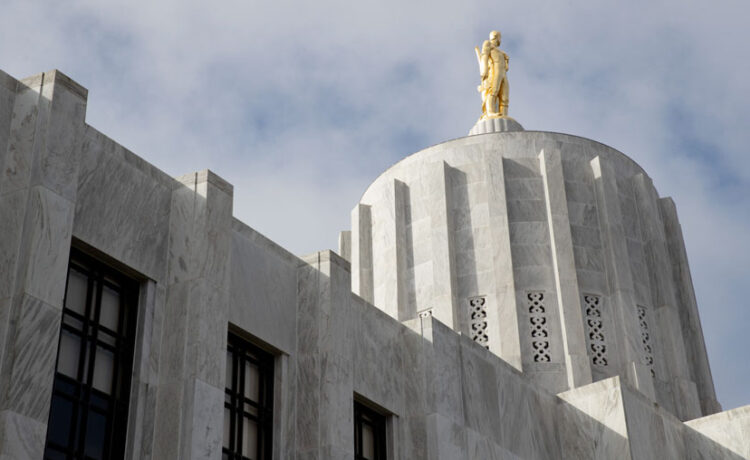Respondents also supported opening primaries to voters who aren’t registered Democrats or Republicans
By Julia Shumway, Oregon Capital Chronicle
Oregonians are cynical about state politics and open to government reforms including campaign finance limits and open primaries, a new report from the Oregon Values and Beliefs Center found.
The report, compiled by the nonprofit and nonpartisan center from two surveys it conducted in late 2023, includes responses from more than 5,400 Oregonians. It comes as lawmakers and voters consider adopting proposals for new limits on campaign finance and changes to state elections and as voters in Portland prepare for their first election with a new form of city government.
It found that 49% of respondents feel their community is on the wrong track, compared to 44% who said it was headed in the right direction. Democrats and respondents with college degrees were most likely to approve of the state’s direction, while Republicans and voters with only some college experience were more negative.
A majority of respondents — 59% — said they would prefer a bigger government that provides more services. But almost as many — 58% — said the government is almost always wasteful and inefficient. That distrust carried over into questions about elections, with 75% of respondents saying the most politically popular candidate, not the most qualified candidate wins, and 58% saying that the current electoral system produces outcomes that reflect the values and beliefs of a small group of political Oregonians, not the values and beliefs of typical Oregonians from around the state.
Pollsters also asked about support for various government reforms, finding that respondents largely supported campaign finance limits and open party primaries. Respondents remained skeptical of other ideas, including different ways of calculating an election’s winner and electing multiple candidates to represent a single district.
Campaign finance reform
After years of legislative stalemates on campaign finance reform, Oregon voters are facing the possibility of seeing two competing measures on the ballot in November: one backed by labor unions who typically support Democratic candidates and one supported by nonpartisan groups including the League of Women Voters. Oregon lawmakers are also considering a proposal crafted by labor groups and business organizations, House Bill 4024.
Oregon is one of only a handful of states that don’t limit campaign contributions, leading to massive spending from a few individuals and groups. Nike co-founder Phil Knight, for instance, spent nearly $7 million in the 2022 election cycle, while the Service Employees International Union, or SEIU, spent more than $3 million just on the governor’s race.
The Oregon Values and Beliefs Center, which is based in Portland, found that 75% of respondents agreed that the state should regulate money in political campaigns, with support growing with age. People who had lived in Oregon for longer than five years were more supportive of campaign finance limits than newcomers.
“Our top priority is to get money out of politics. It’s the only way to make things truly fair. Currently, politicians can be bought, which puts all the power in the hands of just the rich,” a non-affiliated Wheeler County woman in her 40s or 50s told surveyors.
Open primaries
The majority of Oregon legislative races are decided in primaries that only registered Republicans and Democrats can vote in, even though nonaffiliated voters are the largest voting bloc in the state, five of its six congressional districts and many legislative districts.
Supporters of opening up Oregon’s primaries started in spring 2023 to get a measure onto the ballot in 2024 after they disagreed with a ballot title written by the attorney general’s office. But they say they’ve since paused their efforts, instead looking for “more promising strategies to enfranchise voters in Oregon.”
The survey found that 63% of respondents, including a majority of both Democrats and Republicans, believe the two major parties should open their primaries. Older respondents were more likely to favor keeping the current system than young voters, who are more likely to register without a party.
The least popular alternative to the current system was a form of “top two” primary like those held in California and Washington, in which all candidates appear on a primary ballot and the two highest vote-getters move on to the general election. That can result in having both general election candidates come from the same party.
Other reforms
The majority of Oregonians surveyed said the current election system, in which the person with the most votes wins even if they don’t win over a majority of voters, should be changed. But they weren’t sure about how best to do that.
Voters will see one option for changing the electoral system on their ballots in November, following a legislative referral for ranked-choice voting. Under ranked-choice voting, voters rank candidates in order of preference. If a candidate doesn’t initially receive more than 50% of the first-place rankings, the lowest-scoring candidate is removed and the voters who ranked that candidate highest will have their votes reallocated to their second choice candidate. That continues until one candidate gets a majority.
More than a third of respondents said they supported switching to ranked-choice voting, while slightly less than a third said they would prefer a traditional runoff election, in which the top two finishers move to a second election if no one receives more than 50% of the vote.
“We need rank-choice voting,” said a Democratic woman from Washington County between 65 and 74 years old. “I’m a bleeding-heart liberal, but I don’t want anyone as liberal as me in charge. I want moderate centrists to be the decision-makers, compromising for the good of all. Rank choice voting pushes candidates to the middle — it eliminates the need to pander to the fringes (on either side).”
Julia Shumway has reported on government and politics in Iowa and Nebraska, spent time at the Bend Bulletin and most recently was a legislative reporter for the Arizona Capitol Times in Phoenix, Arizona.
















